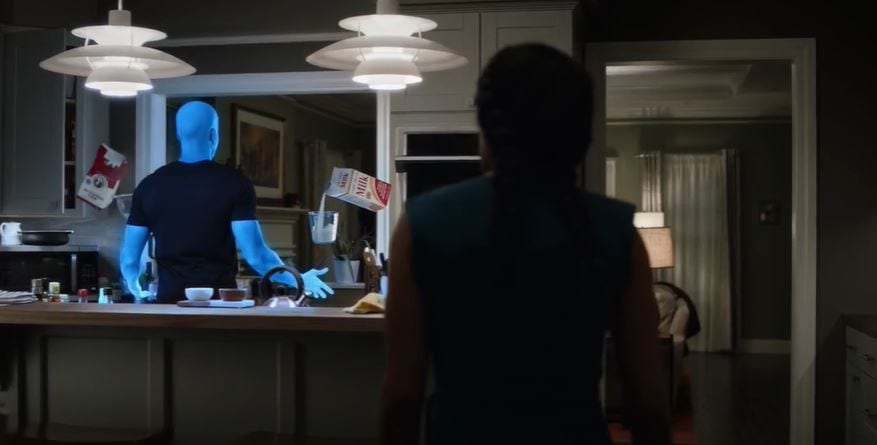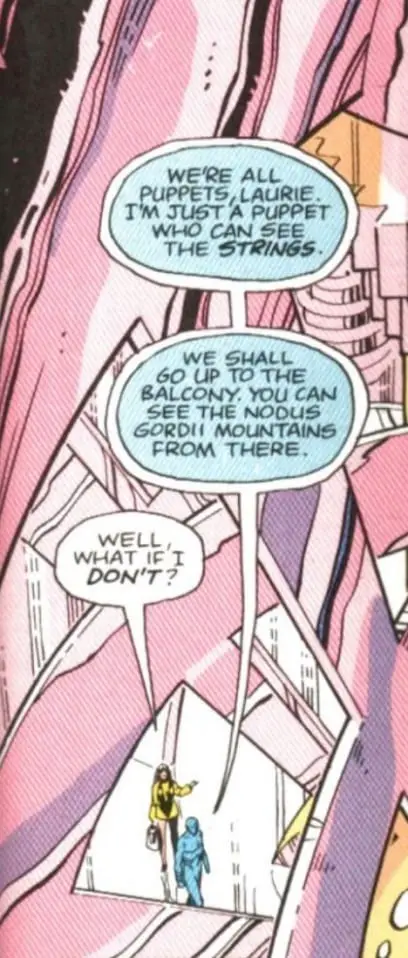I know, not the headline you expect to read after the ending to last week’s episode of Watchmen. Cal Abar is Dr. Manhattan! Angela brought his powers back! The Seventh Kavalry is coming to take him! There’s tension everywhere, and we are on the penultimate episode of the season. Imagine what a tense thrill ride this one would need to be.
Actually, no. Instead, we get a time-bending exploration of love, arguably the best episode yet in this first season, and one that immediately ranks among the most memorable episodes of a Damon Lindelof television show.

Much like how “This Extraordinary Being” reminds you immediately of “International Assassin” or “The Most Powerful Man in the World (and His Identical Twin Brother),” from The Leftovers, “A God Walks into A Bar” has a very obvious comparison in “The Constant” from Lost. Basically, imagine if, throughout that episode, Desmond had a full awareness and experience with experiencing all of time all at once. You’re not far off from how this episode plays out.
One of the most immediately memorable aspects of Dr. Manhattan’s character in the graphic novel is the way he experiences time. There is no linear chain of moments in his life. He experiences the entirety of his life simultaneously. He is both falling in love with his wife Jane and seeing her leave him. He flees for Mars as he meets Laurie on Earth. It is a strange sense of both existing and not existing, of knowing and not knowing. He both knows everything that is happening and is experiencing it for the first time.
On paper, this sounds like a tough challenge for an episode of a television show to replicate. I was a bit stunned at just how well Watchmen handled it. Then I remembered this was Damon Lindelof, a man who cut his teeth on this type of nonlinear storytelling. This is the man who helped create Desmond Hume.
With that in mind, I should not be the least bit surprised at how well he handled an episode focused on Dr. Manhattan’s experience of time. Make no mistake, “A God Walks into a Bar” is an absolute masterclass. Watchmen perfectly captures the feeling of the graphic novel’s portrayal of Manhattan’s life. The way he lives an entire life at once and relives it over and over. Of how everything is both happening at the same time and yet being lived for the first time. It’s so much harder than just placing mixing scenes out of chronological order. There’s a structure to the lack of structure, a feeling to replicate by making the viewer feel like the way the character does.
Lindelof, director Nicole Kassell, and the editing crew manage it with all the little touches needed to make the experience convincing. The way Jon laughs at Veidt telling him he has a lack of imagination minutes after Angela says he has an amazing imagination. The way the moment he falls in love with Angela occurs ten years after he first meets her and tells her he loves her. The way he knows a fight will happen and cannot be avoided no matter how Angela tries. Watchmen mixes and matches in a way that evokes exactly that feeling of both living everything again and also for the first time.
Yahya Abdul-Mateen II also does a tremendous job in this high-pressure role of capturing the emotion, or lack thereof, that defines Dr. Manhattan. There is a delicate balance between that detached, weary sadness and the genuine emotion necessary to make you believe in the relationship he develops with Angela. I’ll leave it up to the individual viewer about whether he or Billy Crudup made for the better Manhattan. However, Yahya most certainly fulfills his end of the bargain. He straddles that line between attachment and detachment quite convincingly. He feels authentic in the way he needed to for this episode to work.

The overall package makes for a memorable, beautiful, unconventional episode, unlike anything you really see anywhere else. I know that’s a tall statement to make in this era of experimental TV dramas that constantly push the envelope and try new things, but it’s true all the same. This episode basically tells a story of God falling in love. Or, as Angela puts it, a story of Zeus turning into a swan to come to Earth and have sex, just without all the problematic parts.
And it makes one thing very, very clear; no one tells a love story like Damon Lindelof. Add Jon and Angela to the pantheon alongside Desmond/Penny and Kevin/Nora.
It’s a bold decision to follow up on last week’s ending by basing an entire episode on what is basically Jon using future experiences with Angela to convince her to go on their first date. Despite everything else we see and all the revelations made, that was the premise. That was the narrative told. It begins with Jon walking into a bar to convince Angela to go on a date, and ends with her agreeing. In between, we see how she has already agreed, and everything it led to. It’s unconventional, but beautiful. It also has a very important place within this narrative.
What really amazes me is how Watchmen handles the multiple paradoxes within. This is where they truly understood the nature of Manhattan’s existence and experiences of time. There are legitimate questions about why exactly he went for Angela in the first place. Why this woman as the one that attracted a god back to human connection. Really, though, that specific part of the why of it doesn’t matter. We have seen throughout the season why Angela is special and beautiful, and we see throughout this episode how the life they lived, which Jon lives all at once and for the first time, made him love her.
The relationship between Jon and Angela is wholly convincing, which it needed to be in the face of Angela’s complete lack of belief when Jon first walks into the bar and greets her. We needed to be convinced just as much as Angela, especially those of us who read the graphic novel.
Once you grasp this essential part of how Manhattan experiences life, how this is not all a linear sequence of events and that he would walk into that bar because of the night the Kavalry came for him, that’s all that matters. Just like Desmond Hume used the love he only felt for Penny in the future to convince her to be there in the past.
Another absolutely amazing paradox created through Manhattan is the Judd Crawford murder. As this episode puts it, the answer is not what came first between the chicken and the egg, because they both arrived at the same time. Will knew Judd was part of the Kavalry because of Angela, who knew it because of Will. It’s absolutely remarkable how well Manhattan was used to make this work, and how faithful it feels to his character from the graphic novel. You just have to accept and believe the way he experiences time.
By that same token, I imagine many people will wonder why Jon just stands there while the Kavalry captures him. Again, it all comes down to how Manhattan is experiencing these events as they happen. There is a misconception that he is reliving these events and can, therefore, change them somehow, but that’s not what is happening. Rather he experiences everything for the first time at the same time, and is always experiencing it for the first time at the same time. He is at fate’s mercy the same as anyone else.

I know it’s not the easiest thing to accept as a storytelling device. But really Manhattan may be aware of what will happen but at the same time, he is seeing it all for the first time. He knows something will happen but doesn’t quite know.
A good deal happened or was revealed in this episode. We found out that Manhattan created the environment on Europa, and Veidt asked to go there. It was heavily suggested that Lady Trieu kept tabs on Manhattan while he was on Europa and that she and Veidt were in contact before he left. Veidt created the squid rains. The manor and servants were based on a childhood experience of Jon’s.
Most importantly of all, the idea of Jon transferring his powers to other people was confirmed by his suggestion that they can be passed on if he transfers his powers into organic matter that can then be consumed. This may or may not mean the Kavalry’s plan will work, but it raises many questions about how Manhattan may have prepared for his powers to pass to someone else. Did he already pass his powers to Will back when Will was eating the eggs in the second episode? Did he cook for Angela so that she would get his powers for the finale? Did their son Topher have some of his powers? How will this come into play in the finale?
These are all questions the finale has put in place and will have to execute, though. For now, let’s just celebrate an absolutely fantastic episode of television that, much like “This Extraordinary Being,” will stand easily among the best episodes of television to air this year. Whatever happens with Watchmen moving forward, whether the finale pulls it all together or whether a second season happens or not, it was all worth it for these two episodes alone.
Make no mistake, though; the finale has shaped up to be pretty outstanding in its own right, and I can’t wait to see how this all shakes out.

